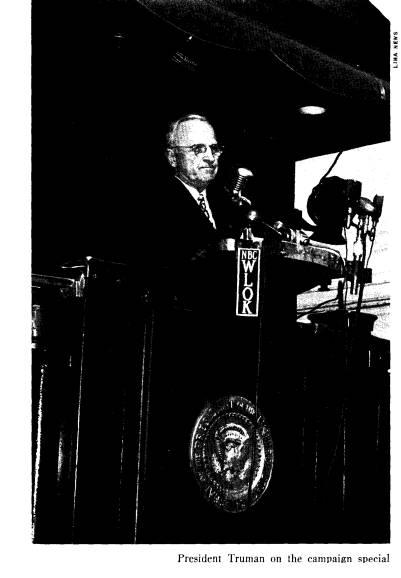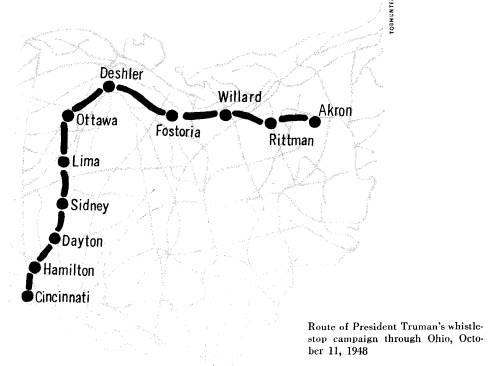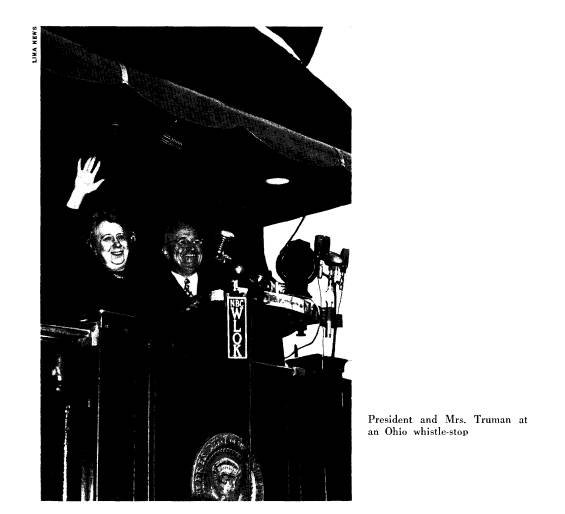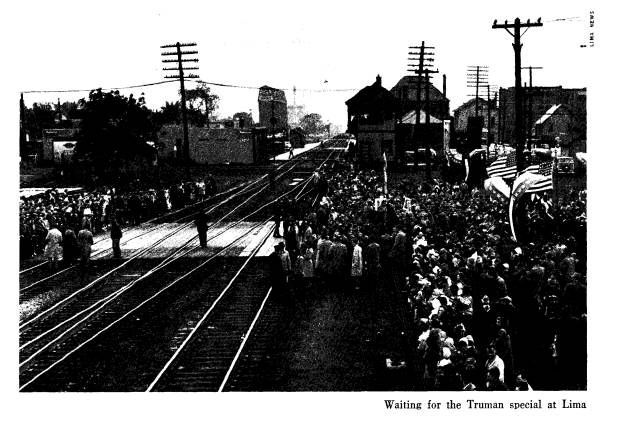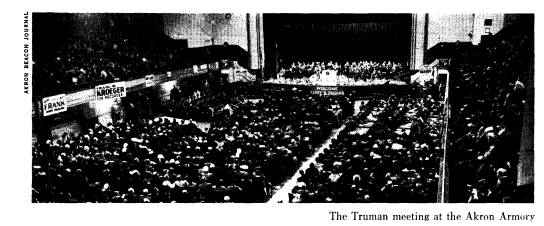Ohio History Journal
|
|
|
WHISTLE-STOPPING Through Ohio by RICHARD O. DAVIES |
|
Ohio played an important role in returning Harry S. Truman to the White House in 1948. Prior to the election he had been foredoomed to defeat by all reputable political seers. Ohio was seen as being safely within the Republican fold, and was supposedly prepared to take part in a nation- wide Republican blitz. Elmo Roper, for example, quit taking samples of voter preference as early as September 9, with the comment that only a "political convulsion" could prevent New York Governor Thomas E. Dewey from winning the presidency.1 The prognostications were ignored by the voters, however, as Truman executed the most startling upset victory in the history of American presidential elections. Ohio went Democratic by over seven thousand votes, while Truman was returned to the White House by a popular-vote margin of over two million. In the electoral college he scored impressively with a 303-189 margin.2 NOTES ARE ON PAGES 196-197 |
114 OHIO HISTORY
Election analyst Samuel Lubell explains
the Truman victory as a result
of the "Roosevelt Revolution."3
The New Deal, creating a Democratic
majority in the nation's electorate, was
the major factor which enabled
Truman to coast to victory. Lubell
insists that the real surprise would have
been a Dewey victory; in fact, had the
turnout of voters been larger, "Dewey
would have been buried in a landslide."4
Even Henry Wallace, with his
1,157,000 popular votes, and Strom
Thurmond, with his thirty-nine Dixie-
crat electoral votes, failed to derail
Truman.
If Lubell is correct, how do we then
evaluate the campaign? To Lubell,
"often the campaign oratory is but
the small talk which conceals the almost
instinctive predispositions which all of
us carry in the backs of our minds.
Certainly no basic reshuffling of party
alignment is possible unless the sub-
conscious, emotional loyalties of the
voters are reshuffled."5 Applying this
idea specifically to Ohio, can we
relegate the Truman whistle-stop journey
through the state to
"small-talk"? Would Truman have won Ohio had he
not waged a strenuous campaign for the
Buckeye vote? Is it not possible
that such a campaign is necessary in
order to remind the voters to be certain
to vote in order to take advantage of
this party domination? Or, is it not
equally possible that such a campaign is
necessary, even vital, to reaffirm
the "almost instinctive
predispositions" of each voter? In other words,
would the 1948 voter have remembered the
New Deal if he had not been
reminded of it?
By examining closely the Truman campaign
in Ohio it is possible to
understand more fully the 1948 election
as well as obtain a detailed view
of a limited but significant part of one
of the most intriguing campaigns in
the nation's history. And, perhaps, such
an examination will suggest that
the whistle-stop campaign was of signal
importance in the election of
Truman.
In view of the supposedly overwhelming
odds facing Truman in Ohio,
it is surprising that he even bothered
to campaign in the state at all. In
1944 Dewey had won the state by almost
twelve thousand votes, defeating
Franklin D. Roosevelt and his relatively
unknown running mate in the proc-
ess. With a hard core of Dewey strength
theoretically already in existence,
there seemed to be little doubt about
Ohio's intention in 1948.6
Although all political experts believed
that "Truman had his back to
the wall" in Ohio,7 the
determined Missourian waged a whistle-stop cam-
paign into the heart of the state on
Monday, October 11. Beginning with
a breakfast speech in Cincinnati and
ending with a state-wide radio broad-
cast from Akron that evening, Truman
covered three hundred miles and
delivered eleven speeches. In the
process, he was cheered by several hundred
|
WHISTLE-STOPPING THROUGH OHIO 115 |
|
|
|
thousand persons; ominous predictions of a Republican romp notwithstand- ing, Truman did not concede a single vote, at least not until he had "told the people the facts."8 The Truman strategy in the Buckeye state, as well as throughout the nation, was not complex. It aimed to achieve two basic objectives, both of which Lubell uses as the key to his interpretation of the election: (1) to get out the vote in order to take advantage of the Democratic preponder- ancy, and (2) to speak clearly on a few easily understood issues which would make the Republican party appear to be the lackey of "big business" and "the vested interests," while at the same time extolling the Democratic party as the "party of the people." In order to accomplish this Truman followed the counsel of Democratic National Committee Research Director William Batt, who suggested in a memorandum to the Truman campaign advisors that in order for Truman to reinvigorate a party split by internal squabbling, the president "should not just exude confidence, but confidence with reasons. He should give our side some good solid substance upon which to hinge the campaign arguments. Platitudes and truisms should be avoided like the pox." And, to take advantage of Truman's homespun midwestern qualities, Batt urged that the wording of the speeches "should be short, homely, and in character. This is no place for Churchillian grandiloquence," he said.9 |
116 OHIO HISTORY
As a result, throughout Ohio as well as
the nation, Truman addressed
himself directly to the labor and farm
blocs, pointing out the advantages of
past Democratic rule. "The
Democratic Party thinks in terms of doing
things for the people--higher
wages--broader social security--protection
in old age--better schools and
homes--and a better life for the men and
women who do the world's work," he
told the Ohio voters.10 While describ-
ing his own party in the meaningful
terms of the New Deal and Franklin D.
Roosevelt (a vote-attracting name which
he did not hesitate to invoke),
Truman placed upon the Republicans the
stigma of depression, and declared
that the opposition party was controlled
by "special interests" which acted
only "at the behest of the
lobbies." Having drawn the images of the two
parties in such black and white terms,
Truman then exhorted his audiences
to "think it over when you go into
the voting booth next month. Think of
the gains you've obtained in the last 16
years--higher wages, social security,
unemployment compensation, federal home
loans to save your homes, and
a thousand other things--and then think
of the Tafts and Tabers."11
Thus the issues discussed by Truman were
those which would appeal
mostly to the middle and lower income
groups. Not afraid to tell his
audience to "vote in your own
interest," he put the campaign upon an
individual level; he simply said that
the working man and his family would
benefit more from his administration
than from that of the Republican
candidate. Bidding for the vote of
organized labor--or at least attempting
to keep it within the Democratic
fold--Truman declared that the Taft-
Hartley act, enacted by the Republican
eightieth congress, had "put the
handcuffs on labor."12 He
told city dwellers that their acute housing prob-
lem was the result of the refusal of the
"do-nothing eightieth congress" to
enact the comprehensive housing bill
which he so ardently championed.
In Dayton, for example, he reminded the
citizens that they had twelve to
fifteen thousand familes living in
substandard homes. "I have been trying
for over three years to get the congress
to pass the kind of housing laws we
need, but the Republican leaders in
congress are now more interested in
what the real estate lobby says than
what the people of this country need."13
He emphasized time and again the rapidly
rising prices and, naturally, laid
the responsibility at the feet of the
opposition: "You know that the Repub-
licans said if we got rid of price
controls, prices would adjust themselves.
Well, they have. They have gone clear
off the chart."14 On taxes, he told
his listeners, the Republicans
"delivered to the rich by passing a rich man's
bill."15 As for the
farmers--traditionally Republican in their politics--
Truman simply reminded them of their
remarkable gains in income since
1933: "Under the Democrats you are
getting a fair share of the whole
WHISTLE-STOPPING THROUGH OHIO 117
country's prosperity. Our federal farm
program is based on a solid truth--
farmers have a right to be sure of a
market for their products at good
prices."16
Because of these facts, Truman
explained, the Republicans did not want
to face "the issues." If the
Republican candidate refused to answer his
challenge, everyone could clearly see
that the Republican leadership was
out to destroy the gains made by the New
Deal. The reason why Dewey did
not speak out was clear--his party's
record was too weak on the major
(Truman-selected) issues. In Hamilton,
for example, Truman berated his
opponent for remaining upon a
supercilious plane, blandly calling for
"national unity" but never
getting down to "the facts." "This campaign
is . . . a crusade to enable the people
of the United States to realize what
this election means. I must face you
personally, or you don't find out.
That's what I'm doing. My Republican
opponents don't discuss the issues.
They are trying to make you believe
there are no real issues," he said.17
In addition to the big
"issues," the veteran campaigner from Missouri
knew the effectiveness of references to
items of local interest. In Dayton he
told his audience that if Daytonian
James M. Cox had been elected president
in 1920, "we never would have had .
. . that boom and bust program which
followed the election of a Republican
candidate."18 In Sidney, recalling his
senatorial committee which investigated
war production, Truman said he
had heard a lot about the war effort in
Sidney. "Sidney has elbow grease,"
he told the crowd, "and we need
this for continuing prosperity."19 In
Rittman, having been presented with a
block of locally produced salt, he
responded with a ready quip; "And
don't think I'm not going to put it on
the tail of the opposition."20
At Fostoria he used the time-tested political
device of praising the virtues of small
town and farm life. Referring to a
recent sarcastic remark made by Robert
A. Taft that "Truman is hitting
all the whistle-stops," Truman
retorted that such towns as Fostoria "are the
backbone of America." And, too, he
was careful to point out that as an
ex-farmer, he had observed from his
train window that Ohio's farm land
appeared to be the "finest in
America," and was, in fact, "almost as good"
as that back home in Missouri.21
Throughout the trip Truman cast down
from the train platform an image
of honesty, sincerity, and simplicity.
This image was further enhanced
by the presence of his wife and daughter
Margaret on the train platform
with him. Here was a man of humble
origins who was not only the leader
of his people but one of them as well.
He was not afraid to trust the judg-
ment of the "people," for he
knew them well from his own Missouri back-
ground. He knew well those who gathered
excitedly around the rear of the
|
|
|
train to catch a glimpse of the president. His ability to reach them was not an unimportant aspect of this trip. "He's the President," a Lima News editorial writer observed, and yet, "he's just an ordinary family man, proud of his wife and daughter. He has something in common with many who heard him."22 Although the Ohio campaign on October 11 would be considered "very successful" by state party leaders,23 it could hardly have begun upon a more dreary note. Arriving in Cincinnati at 7 A.M. on a rainy Monday morning, the president's motorcade from Union Terminal to a Netherland Plaza breakfast gathering of about two thousand Democrats drew just a few hundred spectators. Only scattered clusters of early risers lined the "almost deserted" streets, braving the chilling light rain, as the presidential entourage quickly passed by.24 With no cheering crowd to welcome him to a state he knew he had to win, and with a bleak, grey sky threatening |
WHISTLE-STOPPING THROUGH OHIO 119
to dampen the day's all-important bid
for votes, Truman's spirits visibly
sagged. A veteran political reporter for
the Des Moines Register, who had
traveled with Truman throughout the
campaign, noted that "he looked like
a man who had received bad news but felt
the show must go on."25 At the
hotel, however, where he was introduced
to the assembled Democrats by
Mayor Albert Cash as "a leader of
unflinching courage,"26 Truman re-
sponded with one of his typical
speeches--he vigorously attacked his
opponent. Dwelling upon the theme of
Dewey's refusal to discuss the issues,
Truman noted that while he and
Cincinnatian Robert A. Taft were "as far
apart as the poles on the welfare of the
people, at least you know where
Taft stands, and that is more than you
can say for some Republican candi-
dates." Continuing this line of
attack, Truman said, "You know where I
stand. We are just trying to find out
where the other fellow stands." Turn-
ing to his favorite whipping boy, the
eightieth congress, he charged that
its Republican majority leadership had
"led the fight against price controls"
and "consistently opposed a
national health program" while supporting
"measures which took social
security away from a million people."27
At nine-thirty the president, with his
family, advisors, and a host of Ohio
Democratic candidates headed by
gubernatorial candidate Frank Lausche,
boarded the chartered train and headed
northward. Stopping at industrial
Hamilton at 10 A.M., Truman was greeted
enthusiastically by a crowd
estimated at ten thousand persons.28
The rain had stopped and a brisk
autumn breeze whipped around the train's
rear platform as the Democratic
candidate, obviously very much pleased
with the large crowd, stepped for-
ward to deliver a ten-minute speech on
the evils of Republican congressmen.
The unexpectedly large crowd quickly
restored Truman to his usual fighting
self and erased all thoughts of the
sparse crowd in Cincinnati. It produced
"the most striking change in the
Democratic candidate's demeanor I have
witnessed in all of our trips,"29
the Des Moines reporter observed, as
Truman, making a "natty
appearance" in his blue pin-stripped suit,30 lashed
the Republican congressional leadership
for its dilatory action on the bi-
partisan Taft-Ellender-Wagner housing
bill.31 Explaining in oversimplified
but politically effective terms the
reasons why the comprehensive housing
bill was not enacted despite the
greatest housing shortage in the nation's
history, Truman charged that "they
killed the housing bill at the behest of
the real estate lobby." This was,
he concluded, just one of several reasons
why the Republican candidate did not
desire to discuss the issues.32
By eleven-thirty the diesel-powered
train had arrived in Dayton, where
Cox and Mayor Louis W. Lohrey were at
the station to welcome the presi-
dent to the Gem City. Because he had
arrived during the lunch hour, and
|
120 OHIO HISTORY because the city schools had been dismissed to allow the students to see the president, a very large, excited crowd lined Main Street as Truman and his family were driven to Memorial Auditorium, where he delivered a thirty-minute speech. An estimated fifty thousand persons had gathered along the route to the auditorium, and amid the carnival-like atmosphere that prevailed on a "no-school" day, a young schoolboy, his political symbols slightly confused, was heard to ask, "I wonder if he will ride in on a mule?"33 Truman might not have arrived upon a mule, but he certainly was figuratively astride the Democratic donkey as he opened fire upon the "do- nothing eightieth congress" for opposing all effective price controls. Ob- serving that the "boom and bust" economics practiced by the Republicans had led to the Great Depression in 1929, he pointed out that "they still refuse to give us the protection we need against another crash."34 Turning to housing, he said that when he had given them an opportunity to enact the housing bill in his special session of congress in July, the Republicans had refused to comply.35 |
|
|
WHISTLE-STOPPING THROUGH OHIO 121
Leaving a cheering crowd at the station,
the train continued its northward
journey, making a five-minute stop at
Sidney, where he urged, as he did at
every city visited, the election of
Lausche and local Democratic congress-
ional candidates. "Vote the
straight Democratic ticket, and you vote against
special interests," he said.36
Arriving at 2 P.M. in Lima, which is
centered in Allen County's rich
farming area, the apparently tireless
sixty-four-year-old campaigner re-
minded a gathering of over four thousand
how the New Deal had revived
the national economy after the
depression. Since Franklin D. Roosevelt
had taken office, he pointed out, farm
income alone had increased over nine
times. To insure continued prosperity,
he said, his reelection was im-
perative.37
From Lima the train moved on to Ottawa,
Deshler, Fostoria, Willard, and
Rittman for short stops as it headed
towards Akron. At each stop Truman
spoke in generalities about farm prices,
inflation, and housing, always con-
cluding with his own practical bit of
advice: "Vote in your own interest
or you will be voting for special
privilege." Obviously, the Democratic
party's interests and those of his
listeners coincided perfectly. The short
speech concluded, he would ask his
audience, "Do you want to meet my
family?" and amid a chorus of
cheers, Mrs. Truman and Margaret would
step onto the front of the platform to
smile and wave their greetings to the
assembled Ohioans. Then, with the local
high school band blaring, the
train would pull away slowly, the
nation's first family smiling and waving
goodbye.38
At Akron, where Truman had already
promised to "take the hide off the
Republicans,"39 a very
large and enthusiastic throng, estimated to be near
three hundred thousand in number,
welcomed the president into the Rubber
City as "the rubber workers and the
Democratic machine put on the biggest
political show in the city's
history."40 Still fresh despite the long day of
traveling, hand-shaking, and speaking,
Truman made a strong bid for the
state's labor vote in his 9 P.M.
state-wide radio speech from the Akron
Armory.41 Those who had hoped
for a Truman-type speech were not dis-
appointed, for in an extremely partisan
address he criticized the Republican
congressional leadership for the
Taft-Hartley act and, in doing so, blandly
assumed that all Republicans were
anti-labor. He reminded the armory
audience of twenty-five hundred, and
untold numbers listening on the radio,
that the Republicans had vowed to kill
the gains made by labor during the
New Deal. Fully embracing the New Deal,
Truman said: "The Republicans
don't like the New Deal. They never
liked the New Deal, and they would
like to get rid of it." They were
"waiting eagerly for the time when they
|
|
|
can go ahead and do a real hatchet job on the New Deal without inter- ference," he warned.42 Thus, on a plane of high partisanship, Harry S. Truman ended a fifteen- hour campaign during which he made his major appeal to the Ohio elector- ate. By eight o'clock the following morning he had retraced his trail across northern Ohio and was entering Indiana to begin an equally extensive cam- paign in Hoosierland. What effect did this whirlwind whistle-stop trip have upon the Ohio electorate? Although he was greeted by large crowds throughout the state (except for his early morning visit in traditionally Republican Cincinnati), Truman was probably seen by little more than a half-million persons; and a large number of these were school children. He did not say anything in his speeches that he did not utter time and again in other states. He did not visit many of the major Ohio cities; in fact, he spent valuable time in small towns. However, the psychological impact of the president taking the time to stump representative sections of Ohio asking for support cannot be under- estimated. This is especially significant in view of the fact that Dewey did not actively campaign in the state, for he apparently accepted the opinion of the "experts" that the state was all wrapped up in a Republican gunny sack. Because of the very large shift in the farm vote in Ohio, the time spent in the rural areas seems not to have been wasted. The short visits to representative small rural communities added an important dimension to the Ohio whistle-stop campaign At the end of the day, Frank Lausche, destined to sweep to an easy 215,000-vote victory in his quest to regain the governorship, wholeheartedly endorsed the Truman candidacy in a near-poetic statement which came as a surprise to many Ohio politicians. "Harry Truman," Lausche said, "possesses a soul that reflects the soul of America. He is a good man, a fearless man. He has tried to conduct the affairs of this country so as to bring the greatest good to the greatest number. I will cast my ballot for him in the belief that the nation will be secure by his guidance."43 This ringing endorsement certainly did Truman's cause no harm and possibly |
WHISTLE-STOPPING THROUGH OHIO 123
helped attract independent voters,
among whom Lausche was strong. What
greatly impressed Lausche was the
surprisingly large crowds. "At every
village, town and city, the crowds
waited in startling numbers," one national
magazine reported.44 At one
city the amazed Lausche is reported to have
told Truman, "This is the biggest
crowd I ever saw in Ohio."45
Despite the emphasis upon the issues of
labor, housing, and inflation,
the election returns indicated a slight
loss from the 1944 level in the vote
of labor. It was the radical switch in
the Ohio farm vote which returned
Ohio to the Democratic column. While he
lost slightly in such industrial
areas as Akron and Dayton,46 Truman
made huge gains in the rural areas.
In Putnam County, for example, where
Truman spent ten minutes at Ottawa
discussing the gains made by the farmer
under Democratic rule, the vote
changed from 71.8 percent for Dewey in
1944 to 50.5 percent for Truman.
In Allen County, where he stopped at
Lima, Truman cut the 1944 Dewey
margin by more than fifty percent; the
county went from a 21,024 to a 12,564
popular vote Republican romp in 1944,
to a much closer 17,380 to 13,161
Dewey victory. In Shelby County, where
he visited Sidney, which in 1944
had voted for Dewey by about 1,500
votes (7,084 to 5,622), Truman re-
versed the margin (6,939 to 5,406).47
In the industrial areas, such as
Hamilton, Dayton, and Akron, while the
Democratic margin fell slightly
from 1944, the margin of victory was
still substantial. In these areas his
aim undoubtedly was merely to maintain
his party's strength, and in large
measure he was successful. However, as
the vote returns show, the foray
into the rural areas certainly did not
hurt the Truman cause.
While it is impossible to establish
completely the efficacy of such a cam-
paign trip, the evidence does clearly
suggest that the whistle-stop visit by
Truman to Ohio was an important factor
in determining the final outcome.
Mr. Truman maintains that this trip was
"most decisive," although he is
quick to point out, "I knew I
would win all the time."48 Whatever the
actual effect, the nation-wide Truman
whistle-stop campaign, which covered
22,000 miles and entailed 351 prepared
speeches within a six-weeks period,
is an important event in American
political history. Recalling with obvious
pleasure the Ohio phase of this
campaign, Truman notes that it proved to be
"a grand time" for him as he
presented "the facts as I saw them" to the
hundreds of thousands who heard him on
a cool, windy, sometimes rainy
October Monday in 1948.49
THE AUTHOR: Richard O. Davies is a
graduate student and part-time
instructor in
American history at the University of
Mis-
souri. A native of Ohio, he holds
degrees
from Marietta College and Ohio
University.
